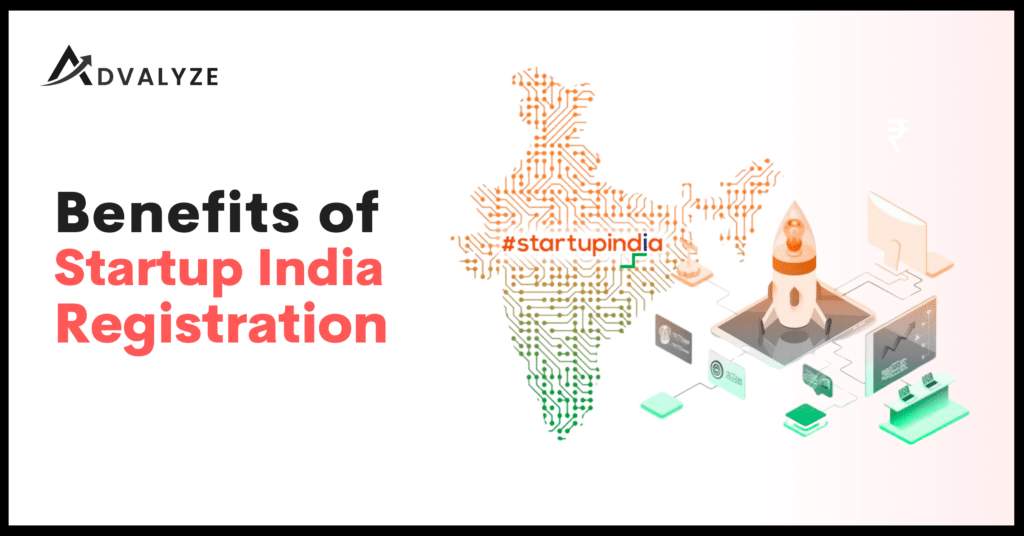The Start-up India Scheme is managed by the Department of Industrial Policy and Promotion (DPIIT). This initiative has been launched by Indian government with the aim to build a strong eco-system for promoting innovation and startups in the country to drive sustainable economic growth and generate large scale employment opportunities.

Benefits of Startup India Registration
- Self – Certification – After obtaining the DPIIT Certificate of Recognition for Startups, the entity will be allowed to self-certify compliance under 3 Environmental Laws and 6 Labour Laws.
- Eligible for a Patent & Trademark Rebate– Startups registered under the Startup India scheme would receive upto 80% discount on patent application fees and upto 50% discount on trademark filing fees.
- Income Tax Exemption under Section 80 IAC– After obtaining the Certificate of Recognition, the startup can apply for Tax exemption under section 80 IAC of the Income Tax Act.
After obtaining the clearance for Tax exemption, the DPIIT recognized startups are exempted from income tax for 3 consecutive fiscal years out of its first ten years since formation
- Tax Exemption from Angel Tax – Startups are mainly funded through angel investors. But such investment is taxable. To increase the funding for startups, the government has exempted registered startups from the tax levied on angel investment under section 56 of Income tax act.
- Easy winding up of Company – The Winding up process for registered entity will be processed on a fast-track basis within 90 days from date of application.
- Government e-Marketplace – Government e-Marketplace (GeM) is an online procurement platform for government departments to procure products and services. DPIIT registered startups can register on GeM as sellers and sell their products and services directly to government entities.
- Government Tenders – There are certain which must be fulfilled such as the requirement of minimum capital or turnover or experience, etc. But if the entity is a registered startup, then the such norms is relaxed for specified tenders even it does not fulfil such requirements. They have even been exempted from submitting Earnest Money Deposits (EMD) while filing government tenders.
Eligibility Criteria
- Type of Entity: Any Private limited company, Limited Liability partnership (LLP) or Registered Partner ship firm are eligible for apply the startup India certificate.
- Annual Turnover: Turnover must not exceed more than 100 crores.
- Innovation and scalable: The entity should be working towards development or improvement of a product, process or service.
- Period of Existence of entity: The Period of existence and operations of the company should not exceed 10 years from the date of formation.
Documents required to get DPIIT Certificate
- Entity Details: Nature of Entity, Industry, Sector, Categories and Company Incorporation Number and Registration Date
- Full Address of the Entity
- Details of the Authorized Representative
- Directors or Partner Details
- Details of Intellectual Property Right
- Details of funding
- Pitch Deck/Video/Website link
FAQs
Q1. What is Startup India Registration?
Startup India registration is the process to incorporate a business entity in the Startup India initiative.
Q2. Where to register startup in India?
For startup registration online, you have to go to the official portal for the registration of startup.
Q3. What are the steps to register a startup in India?
The startup registration procedure is as follows:
- Incorporate your business
- Furnish the documents
- Go to the official portal
- Fill out the startup registration form
- Give answers to the required questions
- Get the startup registration certificate
Q4. Who can register in Startup India?
Following business entities can register in startup India:
- Private limited company
- Public Limited Company
- One Person Company
Q5. What are the benefits to get registered under startup india?
Income tax Exemptions, Rebate for filing IPR application, Fast winding up, Government Tenders etc…
Q6. Which registration is best for startup?
Private limited companies are often considered the best candidates for startup registration in India.
Q7. What is the validity for startup India certificate?
Startup India certificate is valid until 10 years, or once your annual turnover has crossed 100 Crore rupees.
Q8. Can there be registration under startup India for proprietorship?
No. the Sole Proprietorship Firm cannot register under startup India.


0 Comments